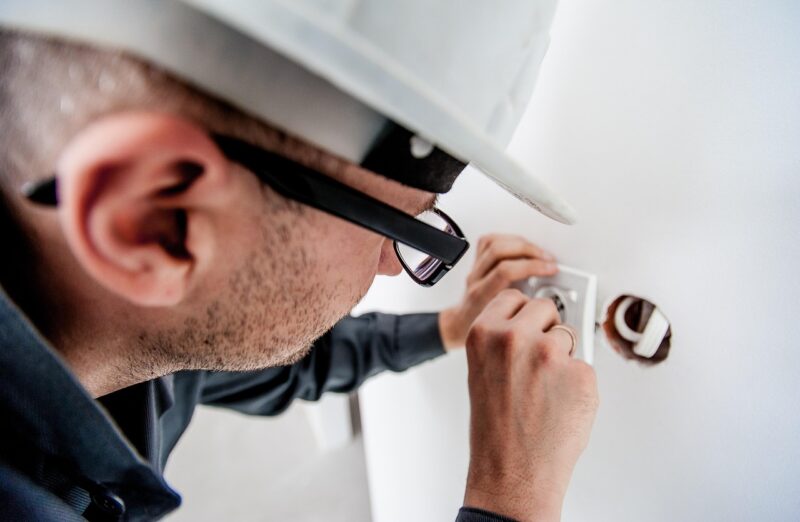Specialist Construction
Specialist construction plays a pivotal role in shaping Lincolnshire’s infrastructure, heritage, and economy. From renewable energy installations to heritage restorations, specialist projects demand unique expertise and contribute significantly to the county’s growth and sustainability.
This dynamic sector offers diverse opportunities for professionals eager to work on projects that require precision, creativity, and collaboration. Whether restoring historic landmarks or constructing cutting-edge data centres, specialist construction provides rewarding career paths for a wide range of skills and interests.

Specialist construction falls into six distinct areas:

Renewable energy installations
Renewable energy construction is at the forefront of Lincolnshire’s push towards sustainability and carbon reduction. Projects include wind farms, solar panel arrays, and biomass facilities, often requiring integration with existing infrastructure. Teams work to identify suitable locations, install advanced renewable energy systems, and ensure efficient energy production. These developments not only provide green power to local communities but also support national energy goals.
With cutting-edge technologies and environmental innovation, renewable energy construction shapes a cleaner future for the county.
Working in renewable energy construction is ideal for individuals passionate about sustainability and advanced technologies. Day-to-day tasks range from site surveys and equipment installation to project management and system maintenance. Roles such as renewable energy engineers, technicians, and planners offer dynamic career opportunities.
This sector is perfect for those who thrive on solving environmental challenges and contributing to a greener Lincolnshire, with exciting prospects in a rapidly growing industry.

Healthcare buildings
Healthcare construction involves designing and building facilities such as hospitals, clinics, and care homes that meet the needs of Lincolnshire’s diverse population. These projects require meticulous planning to ensure safety, compliance with health regulations, and the integration of medical technologies. Teams work on creating patient-centred environments that enhance comfort and functionality.
From surgical suites to rehabilitation centres, healthcare buildings serve as critical infrastructure supporting the region’s well-being and healthcare delivery.
Working in healthcare construction combines technical precision with human-centred design. Professionals handle complex tasks such as coordinating with medical experts, ensuring sterile environments, and incorporating specialised systems. Key roles include architects, HVAC specialists, and construction managers.
This sector is rewarding for those who want to contribute to the creation of essential facilities that directly impact lives, offering both career growth and the satisfaction of building spaces that promote healing and care.

Heritage restorations
Heritage restoration projects aim to preserve Lincolnshire’s historic landmarks while maintaining their cultural and architectural integrity. These projects include restoring stately homes, churches, and medieval buildings, often involving delicate repairs to stonework, timber, and other traditional materials. Teams collaborate with conservationists to ensure the use of authentic techniques and materials.
Heritage restoration not only protects the county’s history but also supports tourism and community pride, making it a vital aspect of Lincolnshire’s construction sector.
Working in heritage restoration offers a unique opportunity to combine traditional craftsmanship with modern conservation methods. Roles include conservation architects, stonemasons, and restoration specialists who take pride in preserving history for future generations. Tasks range from structural assessments to hands-on repairs and detailed restorations.
This field suits individuals with a passion for heritage, attention to detail, and a commitment to safeguarding Lincolnshire’s rich cultural legacy.

Education centres
Education construction involves creating schools, colleges, and universities designed to inspire learning and foster community engagement. These projects include classrooms, laboratories, libraries, and sports facilities, often integrating sustainable practices and cutting-edge technologies. Teams work on designing layouts that enhance collaboration and accommodate evolving teaching methods.
By building modern educational environments, these projects play a critical role in supporting the academic and socio-economic development of Lincolnshire’s students and educators.
Working in education construction is ideal for individuals who enjoy creating spaces that make a lasting difference. Roles range from structural engineers and architects to site managers and interior designers. Professionals handle tasks such as planning multi-functional layouts, ensuring safety standards, and integrating smart technologies.
This sector is perfect for those passionate about education and innovation, offering the satisfaction of building facilities that shape future generations and strengthen local communities.

Data centres and technology hubs
Data centre and technology hub construction supports Lincolnshire’s growing digital infrastructure, enabling faster communication and efficient data storage. Projects include building high-security server farms, research labs, and innovation hubs equipped with advanced cooling and power systems. Teams focus on delivering robust, scalable facilities capable of supporting a range of industries, from healthcare to e-commerce. These projects require precision and expertise to meet strict standards for cyber security, performance, and energy efficiency.
Working in data centre construction offers exciting opportunities for tech-savvy individuals with an eye for detail. Roles include IT infrastructure engineers, electrical specialists, and construction managers who oversee secure installations and efficient layouts. Day-to-day tasks involve system integration, environmental controls, and ensuring uninterrupted operations.
This fast-evolving field is ideal for those who want to shape the future of technology in Lincolnshire while working on state-of-the-art projects.

Defence and security
Defence and security construction focuses on building highly secure facilities such as barracks, command centres, and training grounds for military and government use. These projects prioritise confidentiality, durability, and resilience, often requiring advanced construction techniques and materials. Teams design and construct facilities that can withstand rigorous use and adhere to stringent security standards.
Defence projects also often involve specialised features like blast-proofing and reinforced structures to meet the unique demands of this critical sector.
Working in defence construction is suited to individuals who excel in precision-driven, high-security environments. Roles include structural engineers, security compliance officers, and project supervisors, all contributing to the creation of classified or restricted facilities. Day-to-day tasks range from liaising with government bodies to implementing advanced construction solutions.
This sector offers the opportunity to make a tangible difference in national security, providing challenging yet rewarding career opportunities for those with a commitment to excellence and safety.
Check out the different roles below

Management and coordination
Management and coordination roles are the backbone of specialist construction projects, ensuring seamless planning and execution. These professionals oversee project timelines, budgets, and team collaboration to achieve desired outcomes. Day-to-day tasks include conducting site visits, managing contractors, resolving logistical challenges, and liaising with clients and stakeholders. In projects like defence facilities or healthcare buildings, managers ensure safety protocols are upheld, allocate resources efficiently, and monitor progress to keep projects on schedule and within budget.
Key roles: Construction manager, project manager, site supervisor, health and safety officer, operations coordinator.
Skills & attributes: Leadership, strategic planning, problem-solving, communication, organisational skills, knowledge of industry-specific regulations.
Scorecard
Salary Potential*
Flexible Hours
Flexible Location
Physicality
*based on a 40-hour working week

Engineering and design
Engineering and design professionals bring technical and creative expertise to specialist construction projects. These roles involve developing blueprints, conducting site evaluations, and ensuring compliance with strict industry standards. Engineers may design structures like wind turbines or healthcare facilities, while architects create layouts for education centres or data hubs. Daily tasks include preparing CAD drawings, evaluating environmental impacts, and collaborating with contractors to refine designs that are functional, efficient, and visually appealing.
Key roles: Architect, structural engineer, civil engineer, design engineer, CAD technician.
Skills & attributes: Technical proficiency, creativity, attention to detail, analytical thinking, teamwork, familiarity with industry-specific technologies and regulations.
Scorecard
Salary Potential*
Flexible Hours
Flexible Location
Physicality
*based on a 40-hour working week

Trades and practical roles
Trades and practical roles are integral to specialist construction, transforming designs into reality. Skilled workers assemble structures, install systems, and operate machinery to meet project goals. Daily activities include tasks like wiring electrical systems for healthcare buildings, installing solar panels on renewable energy projects, or crafting masonry for heritage restorations. These professionals follow technical drawings, maintain safety protocols, and ensure that high-quality standards are achieved across all aspects of construction.
Key roles: Electrician, plumber, carpenter, stone mason, machine operator, solar technician.
Skills & attributes: Physical stamina, manual dexterity, problem-solving, adherence to safety protocols, teamwork, knowledge of specialised equipment and techniques.
Scorecard
Salary Potential*
Flexible Hours
Flexible Location
Physicality
*based on a 40-hour working week

Heritage restoration roles
Heritage restoration roles focus on preserving Lincolnshire’s historic landmarks. Specialists use traditional techniques alongside modern conservation methods to maintain the authenticity and integrity of historic structures. Daily tasks include repairing stonework, restoring original timber beams, and researching historical details to ensure accurate preservation. Teams also work with local authorities and conservation groups to align restoration efforts with heritage standards while integrating discreet modern reinforcements for safety and longevity.
Key roles: Conservation architect, stonemason, restoration specialist, heritage consultant, decorative artisan.
Skills & attributes: Attention to detail, craftsmanship, historical knowledge, ability to work with delicate materials, patience, problem-solving.
Scorecard
Salary Potential*
Flexible Hours
Flexible Location
Physicality
*based on a 40-hour working week

Renewable energy roles
Renewable energy roles involve installing and maintaining systems like wind turbines, solar panels, and biomass facilities. These professionals handle tasks such as assessing site viability, assembling renewable energy systems, and conducting routine maintenance to optimise performance. Engineers may develop wind turbine designs, while technicians handle the physical installations. The focus is on ensuring sustainable energy production through innovative solutions that integrate seamlessly into existing infrastructure.
Key roles: Renewable energy engineer, wind turbine technician, solar installer, environmental planner.
Skills & attributes: Technical skills, problem-solving, environmental awareness, adaptability, proficiency with renewable energy technologies.
Scorecard
Salary Potential*
Flexible Hours
Flexible Location
Physicality
*based on a 40-hour working week

Defence and security roles
Defence and security roles focus on building highly secure facilities such as barracks and command centres. Professionals in these roles perform tasks such as designing reinforced structures, ensuring compliance with classified requirements, and implementing advanced security systems. Daily activities include coordinating with government bodies, inspecting secure installations, and integrating specialised materials like blast-resistant concrete to meet rigorous safety standards. These roles demand precision and reliability at every stage of the project.
Key roles: Security compliance officer, defence engineer, structural specialist, project supervisor.
Skills & attributes: Precision, reliability, problem-solving, familiarity with security protocols, technical expertise.
Scorecard
Salary Potential*
Flexible Hours
Flexible Location
Physicality
*based on a 40-hour working week
In addition to the technical, management and coordination roles, Specialist Construction projects rely on support functions like marketing, finance, procurement, IT HR and operations. For more information on these departments and the roles they offer, click here to explore further.
For information on local courses and qualifications that could support your career in construction, please click here.

